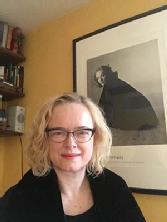Representing Totalities
How do we imagine the future of life and how is this represented in mass culture?
We explore how we use science fiction to understand science fact, investigating the ways in which conceptions of ‘the global’ and ‘the planetary’ are constructed and negotiated in cultural mythology, cosmology, philosophy and mass culture. Historicising and deconstructing conceptions of the ‘Anthropocene’ – the contemporary geological epoch as one that is marked by humanity’s impact on the earth’s geology, ecosystems and climate – through analyses of its presentation in mass culture.
Research Activities
Visualising Science
Bid for AHRC funding ‘Where Next’ call: ‘Visualising Science: Exploring the Roles of the Visual Image in Science’. An interdisciplinary exploration of the crucial role of the visual image in the presentation, dissemination and cultural understanding of scientific findings, addressing the contexts in which such images are produced, their formation for/by different types of audience, the visual traditions on which they draw and the key conceptual/theoretical debates that accrue to them.
The Science of Quality
Bid for AHRC scoping funding, made in Spring 2020, in collaboration with the Innovative Manufacturing and Future Materials GRP. Science is usually seen in terms of production, in terms of the things it makes. But it is also a form of evaluation, a way of determining the quality of the food we drink, the air we breathe, the materials we build with, and much else. The sciences of quality, from analytical chemistry to food science, are bound up with questions of value that are also central to the humanities and social sciences. These sciences are becoming increasingly important in the twenty-first century, as science becomes ever more wedded to commercial and industrial applications, and as the global environmental crisis draws attention to the quality of natural substances such as air, water and soil. This bid drew together researchers in materials science, law, sociology, and history with a view to exploring the links between science and value in the past, present and future. Although the bid to the AHRC was not successful, follow-up events are planned for 2022 in collaboration with the Innovative Manufacturing and Future Materials GRP.
Related Webinars
'The Anthropocene Unconscious: Climate Catastrophe Culture'
Speaker: Dr Mark Bould, Reader in Film & Literature, Faculty of Arts, Creative Industries, and Education, UWE Bristol
In The Great Derangement: Climate Change and the Unthinkable, Amitav Ghosh suggests – from the viewpoint of an imaginary future – that ‘ours was a time when most forms of art and literature were drawn into the modes of concealment that prevented people from recognising the realities of their plight’. However – as with all denialisms – contemporary literary and pulp fiction, comics, and arthouse, blockbuster and trash cinema reveal every bit as much as they conceal. This presentation outlined the three premises underpinning the opening chapters of forthcoming The Anthropocene Unconscious: Climate Catastrophe Culture: that the stories we tell about the world matter, but it is not always easy to know where to start them or what to call them; that the stories we tell about the world matter, but it is never easy to keep control of them; and, that the stories we tell about the world matter, and sometimes they contain sharknados.
This seminar was hosted by the Centre for Research in Philosophy, Literature and the Arts and the Habitability GRP


